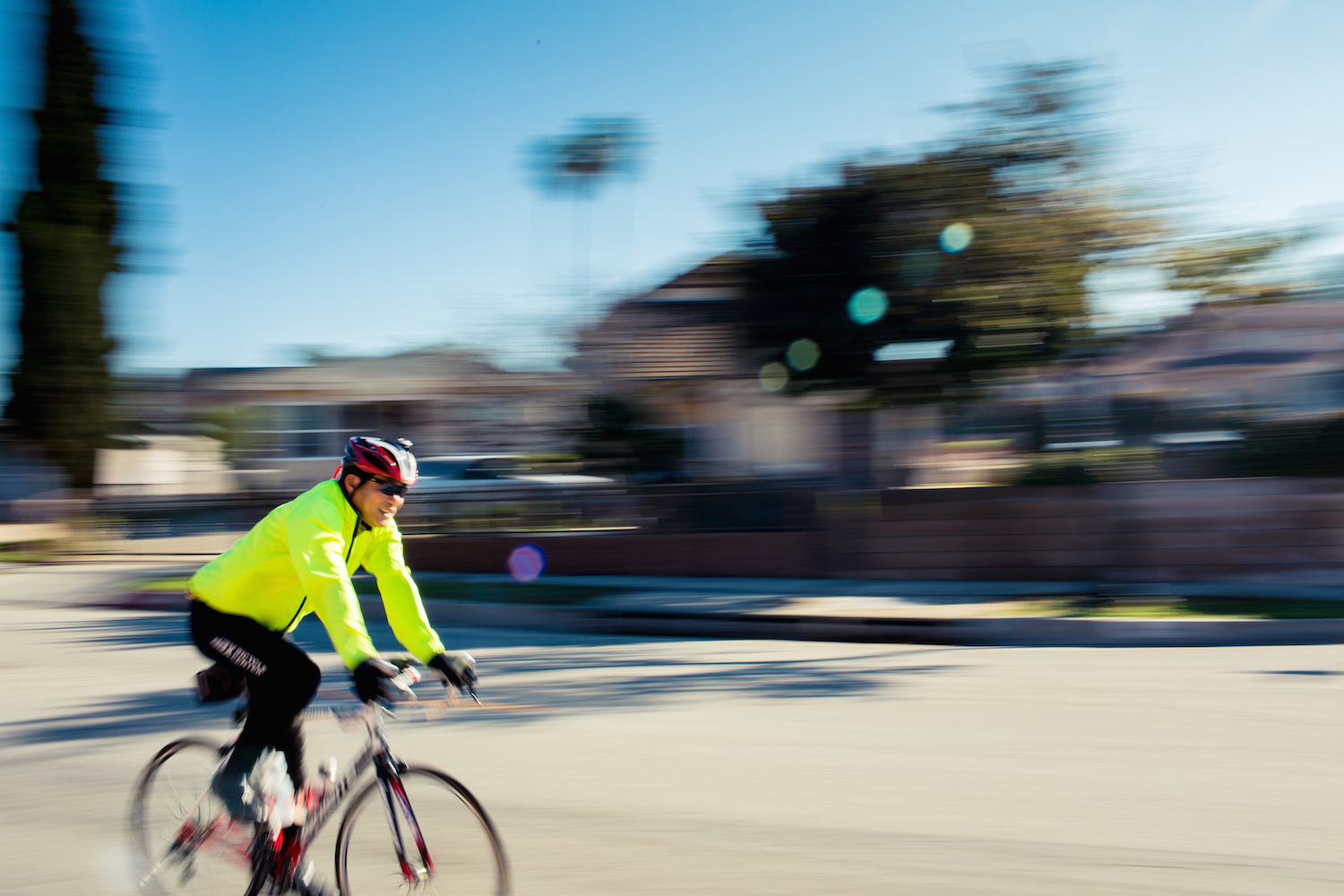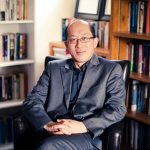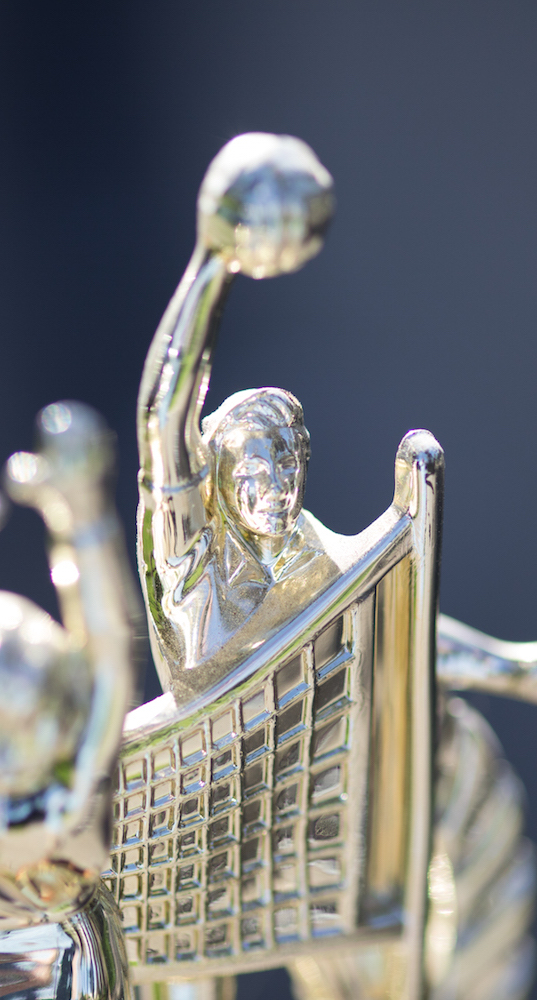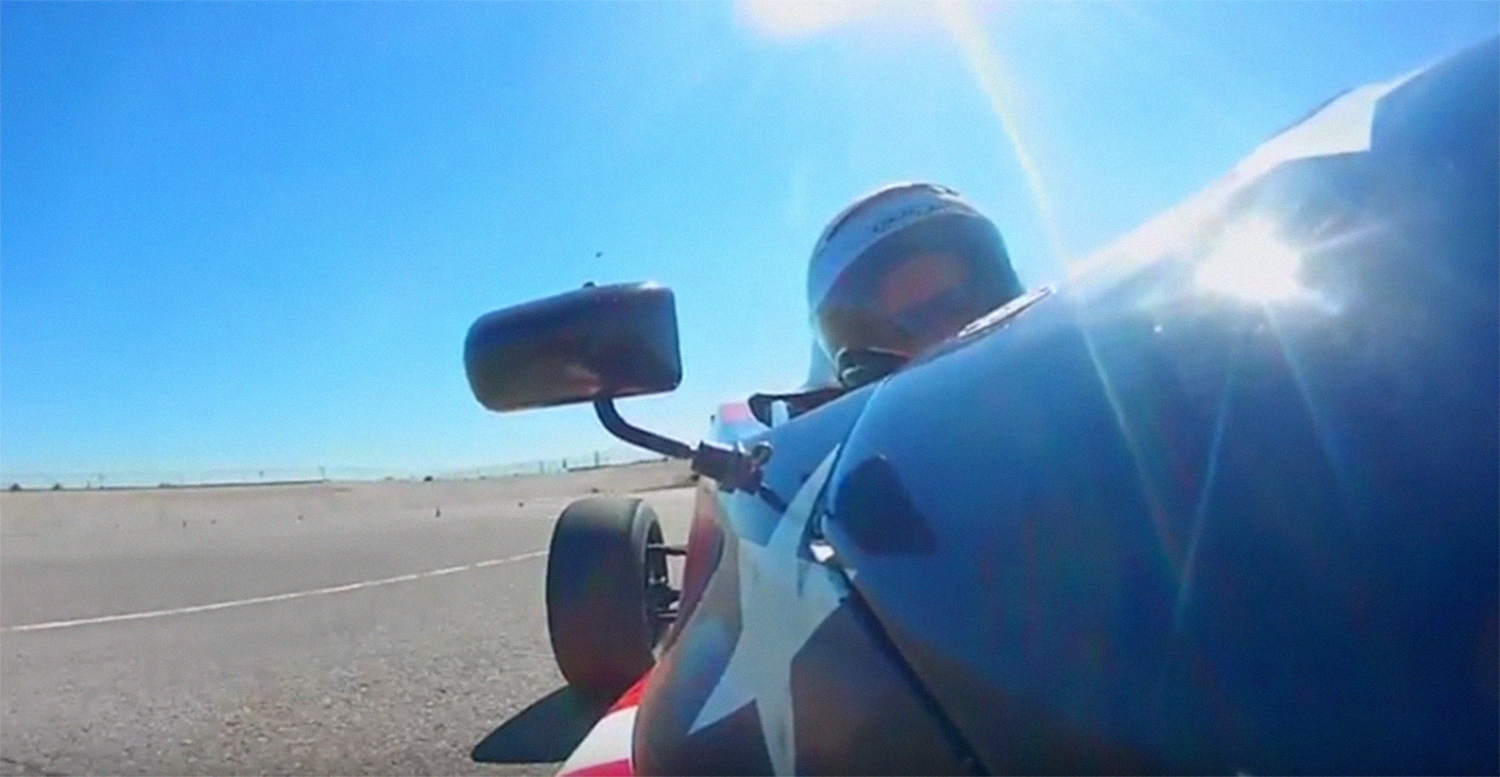
“Rigorous physical activity, like sports, that emphasizes striving, growing, becoming ever better and more capable, is a spiritual activity. . . . Sport serves as a systematic vehicle for this spiritual pursuit, the improvement of the body, the whole person, and the spiritual self.”
+ Erik W. Dailey, PhD student and adjunct professor, from his essay “Sport and Transcendence through the Body” in the International Journal of Public Theology. Erik was one of many speakers at the inaugural Global Congress on Sport and Christianity held at the Yorkminster Cathedral in York, England. Other Fuller representatives included Adam Metz (DMin student), Ben Houltberg, associate professor of human development, Rubén Fernández Morales (MAT student), and Robert Johnston, professor of theology and culture, who are quoted on this page. Dean of Students Steve Yamaguchi (pictured above) enjoys the rigorous activity of riding to work every day, and recently took a group of students on his route from Pasadena to Long Beach, California.
Rethinking Winning

“While winning and competition are not inherently theologically empty, Christians must look beyond ‘winning’ and seek to infuse the contemporary sports culture with beauty and creativity. In order to do that, Christians must acknowledge the beauty and creativity that often are found outside of winning.”
+ Adam Metz, DMin student, from an essay on sports and popular culture. Adam was one of the many Fuller representatives at the Global Congress on Sports and Christianity.
 “Reading St. Paul from a disability perspective urges reconsideration of how to understand the metaphors of winning and achievement of the imperishable prize. Within this Pauline framework, winning does not come at the expense of losers. On the contrary, those who are most successful are shaped by norms of competition that foster the well-being of others, that honors and respects those who are otherwise deemed weak and inferior, and that seek to edify the whole rather than the individual self. Is it possible for us to develop a Pauline theology of sport from this platform?”
“Reading St. Paul from a disability perspective urges reconsideration of how to understand the metaphors of winning and achievement of the imperishable prize. Within this Pauline framework, winning does not come at the expense of losers. On the contrary, those who are most successful are shaped by norms of competition that foster the well-being of others, that honors and respects those who are otherwise deemed weak and inferior, and that seek to edify the whole rather than the individual self. Is it possible for us to develop a Pauline theology of sport from this platform?”
+ Amos Yong, professor of theology and mission, analyzes Paul’s use of athletic metaphors for the Journal of Disability and Religion. Read the whole article here and more on able theology.
“We do not just have bodies. We are our bodies. Our bodies inescapably relate to who we are and what we do in sport and life. No bodies, no sport. Sport is an embodied performance which humans do in the good bodies God created. That means our bodies matter. Since our bodies are good gifts from God, then what we do with the work of our heads, hands, and feet in the games we love to play should support and express the God-given value of the human body.”
+ From What Does It Really Take to Be Great?, a collection of theological and scriptural reflections to help athletes understand emotions, character, adversity, and more. The resource was edited by Rubén Fernández Morales (MAT student), the Western Europe coordinator for the international sports ministry Athletes in Action.
Sports and Thriving
 “Performance-based identity is an identity where people put their worth and value into how they perform in sport. What I’ve found in my research is that this performance-based identity is also associated with a fear of failure, with perfectionistic concerns, and with fear of disappointing those around you. Physiologically, when we put our worth and value into our performance, we can begin to anticipate competition as a threat to our actual selves, which triggers some of the same mechanisms as real fears and threats and pulls from our resources in negative ways.
“Performance-based identity is an identity where people put their worth and value into how they perform in sport. What I’ve found in my research is that this performance-based identity is also associated with a fear of failure, with perfectionistic concerns, and with fear of disappointing those around you. Physiologically, when we put our worth and value into our performance, we can begin to anticipate competition as a threat to our actual selves, which triggers some of the same mechanisms as real fears and threats and pulls from our resources in negative ways.
“It leads to four areas of coping: blame, shame, creating chaos, and control—things that really undermine people’s emotional health. . . . Changing this identity starts with understanding that your worth as a human being goes far beyond sports and athletics. It’s connecting to a purpose. Purpose organizes around a life aim, it’s based in relationship with other people, and it’s something greater than yourself that contributes to your sense of identity and worth.”
+ Benjamin Houltberg, associate professor of human development, leads research in Fuller’s Thrive Center on a variety of topics related to sports and thriving and encourages elite athletes through Hope Sports, a nonprofit that connects athletes with acts of service. Listen to his interview on sports and purpose. How do altruistic motives affect sport? How do outcomes differ between someone running a marathon and someone running a marathon to help others? With support from the Templeton Foundation, the Thrive Center for Human Development at Fuller’s School of Psychology explores these questions through research on World Vision marathon runners and the relationships among purpose, thriving, and sports.
 “Although winning can create a pedestal to preach the gospel, it can also leave Christian athletes feeling that they must attain athletic success to be useful to God’s kingdom. This would be an example of ministering ‘through’ athletes rather than ministering ‘to’ athletes. In contrast, the latter focuses on sport as a context for spiritual transformation as a part of one’s vocation, which includes giftings that (a) remind one of God’s unchanging love, (b) provide a source of joy, and (c) create opportunities to connect and serve others.”
“Although winning can create a pedestal to preach the gospel, it can also leave Christian athletes feeling that they must attain athletic success to be useful to God’s kingdom. This would be an example of ministering ‘through’ athletes rather than ministering ‘to’ athletes. In contrast, the latter focuses on sport as a context for spiritual transformation as a part of one’s vocation, which includes giftings that (a) remind one of God’s unchanging love, (b) provide a source of joy, and (c) create opportunities to connect and serve others.”
+ Sarah A. Schnitker, associate professor of psychology, with Benjamin Houltberg, associate professor of human development, in their essay on developing virtues in athletic contexts. Read the whole article.
“When I started training, I would have said that I run to be as impressive as my brother, to have that medal around my neck instead of simply being the little sister at the finish line. But over these months, my view has changed. Now I would say that I run to connect with the church, to form bonds that will last a lifetime. We have all experienced a lot over the past few months: moments of joy and moments of sorrow, moments of peace and moments of pain, but what was most important was that we could all share these moments together. A true church family, united by a cause and a God much bigger than any of us could ever imagine.”
+ A runner on the World Vision marathon team reflecting on her experience in an article by Meredith Miller (MDiv ’08), available at the Fuller Youth Institute.
“While some people are naturally driven by purpose, many people base their worth in what they do rather than in who they are. We believe that through experiences like a home build with Hope Sports, identities can begin to shift towards something greater than achievement. This shift occurs through meaningful encounters that are experienced cognitively with the mind and affectively with the heart.”
+ Christa Nelson, a student researcher at the Thrive Center, reflecting on redirecting sports away from destructive forms of competition and towards purpose. Read her reflections here.
“Want to know the six words [children] most want to hear their parents say? ‘I love to watch you play.’ That’s it. Nothing aggrandizing like ‘you’re an all star,’ and nothing instructive like ‘here are a couple of things I noticed that you can work on.’ Just ‘I love to watch you play.’ As I gear up for soccer, band concerts, baseball, and everything else I’ll be watching my three kids do this year, I’m internalizing these six words. I’m sure I’ll say other things, some that are helpful and some that aren’t. But I want my kids to hear that doing what they do, and learning about who God created them to be, is a joy to watch as it unfolds.”
+ Brad Griffin, the associate director of the Fuller Youth Institute, in an essay considering research on youth athletics and emotional health. Read more online.

My life and my aging is a gift, and I have to figure out how to wrestle the gift from that, and it’s not always obvious. Training for a triathlon is one way that I can attend to my own body, and when I exercise, I practice attending to the present—including its sometimes unwelcome limitations!”
+ Erin Dufault-Hunter, assistant professor of Christian ethics, on the value of embodied physical activity. When Erin is not teaching ethics, she is often biking or training for a race (her medals are pictured above). Watch her interview about mortality and the body here.
Fuller At Play

 “In the 2016 national championship, I spun our car in the showcase turn right in front of everyone—it was such an ugly spin! I ended up winning the class that year, but I can’t just focus on the performance. If I only analyze my runs, compare my times to my son’s and husband’s times, and focus on my mistakes, I know I’ve lost something. It’s important for me to choose to have fun. If I’m not enjoying the sport, then it’s only another form of work. Racing engages my whole self, and when I’m free to enjoy it, I feel so alive.”
“In the 2016 national championship, I spun our car in the showcase turn right in front of everyone—it was such an ugly spin! I ended up winning the class that year, but I can’t just focus on the performance. If I only analyze my runs, compare my times to my son’s and husband’s times, and focus on my mistakes, I know I’ve lost something. It’s important for me to choose to have fun. If I’m not enjoying the sport, then it’s only another form of work. Racing engages my whole self, and when I’m free to enjoy it, I feel so alive.”
+ When Mari Clements isn’t leading Fuller’s School of Psychology as dean, she’s racing competitively with her family. They’ve enjoyed the sport for over 20 years—and won numerous national and ProSolo championships along the way. On some days, she’s walking around the Pasadena campus in racing flag heels, a quiet nod to the action-packed sport.
 “I like to commute by bike because it helps me reconnect with our planet and our Creator. Twenty-five miles feels different when pedaling myself over it rather than sitting in a car. I sweat and breathe a lot and feel purged and invigorated when I get home. When I’m on the riverside bike path, for the southern half of the ride I find a contemplative rhythm that is prayerful and quieting. When I’m on the urban northern half of the ride, I pray for all different kinds of people I see on the route through some very diverse urban neighborhoods. Riding my bike helps me pray and see God in ways I wouldn’t see otherwise.”
“I like to commute by bike because it helps me reconnect with our planet and our Creator. Twenty-five miles feels different when pedaling myself over it rather than sitting in a car. I sweat and breathe a lot and feel purged and invigorated when I get home. When I’m on the riverside bike path, for the southern half of the ride I find a contemplative rhythm that is prayerful and quieting. When I’m on the urban northern half of the ride, I pray for all different kinds of people I see on the route through some very diverse urban neighborhoods. Riding my bike helps me pray and see God in ways I wouldn’t see otherwise.”
+ Dean of Students Steve Yamaguchi bikes to Fuller Pasadena from Long Beach—a daily commute that helps him pray with his whole body. He recently took a group of students for a weekend ride down to Long Beach. On the ride, organized by the All Seminary Council, the group biked over 30 miles from Pasadena, through downtown Los Angeles and over the LA River, and ended at the waterfront. ASC Sports Coordinator Chase Weaver said, “Recently, we’ve started emphasizing outdoor-type events and drawing from our very active faculty and staff to accompany and even lead these events. Steve has been riding for years and was the perfect companion for our veteran and rookie riders on a trip through the region we call home.”

“If a person is not able to play, he is easily bewitched or possessed by his own seriousness or the seriousness of another. Inhumanity is the result. Play breaks through such barriers and thus serves as a prologue to and/or a check upon a life of freedom. . . . Play revitalizes our ‘over-seriousness’ toward life, filling us with a spirit of joy and delight that carries over into all aspects of our existence. This attitude is based in and fosters the tacit recognition of a restored humanity that senses its rootedness in life’s fundamental sacredness.”
+ Robert K. Johnston, professor of theology and culture, from his book The Christian at Play, an influential theological reflection on play, sports, and leisure. Fuller students (pictured) take a break from studying to play a game of intramural soccer against Caltech students on their campus—a friendly way to engage our academic neighbors.
Resources
The Christian at Play
by Robert Johnston (Wipf & Stock, 1997)
Theology of Sport and Fitness with Erik Dailey (Course)
The post Voices on Sports appeared first on Fuller Studio.